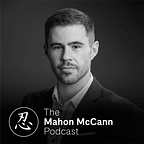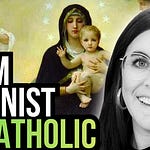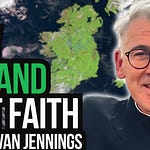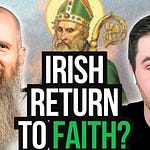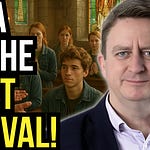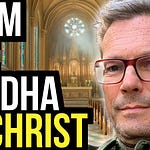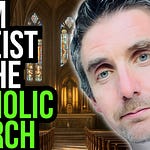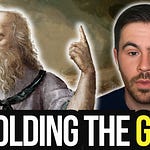In the last essay, we looked at Rene Magritte’s ‘The Son of Man’ painting as an image of the fallen, meaning crisis individual. You might notice a similarity between the painting and the cover of my last book, ‘The Man with a Mirror Face’, which presents an intermediate character of the conscience that reflects our character like a mirror, which we will discuss. In this essay, we will look at Peterson’s solution to The Fall, looking at a fundamental weakness in his argument and strengthening it with Vervaeke’s framework and, finally, bringing to the fore the attitude that this existential philosophy represents with the cultivation of meta-cognition and moral grounding.
Peterson’s Solution To The Meaning Crisis.
Peterson’s argument is rooted in biology. The reason for rooting his essentially ethical argument in biology is to demonstrate the falsity of the post-modern predicament. Postmodernism rejects all grand narratives as arbitrary power games because of a subjective theory of truth and human nature. In postmodernist thought, cultural systems (for lack of a better description) are imposed top-down to control people and are culturally relative. Peterson rejects this idea because he argues that biology constrains our morality. Human beings have in-built motivations and emotional systems that constrain the games we will voluntarily play (he equates morality to essentially a social game we all opt into or not).
He argues you can force someone to play a game that is not fulfilling their needs but that this won’t work in the long run - like communism. His argument is the same as Plato’s in ‘The Republic’, which is that to know what we ought to do (our ethics), we must first understand what we are (human nature). This is why most of the Republic is first a human anthropology before looking at the virtues. Postmodernism, looking at people as totally socially-constructed, a blank slate theory of human nature, thus has no foundational anthropology to justify a universal ethics, all ethical systems are reduced to culturally relative power games.
We looked at Peterson’s cognitive anthropology in essay three, but his first assertion is similar to Vervaeke’s, which is ‘to be a cognitive agent is to see the world through an implicit frame of value’. In other words, we are finite, the reality is infinite, and so we can only perceive reality through an implicit frame of value that simplifies complexity. The frame of value protects us from the dysregulating effects of chaos, uncertainty, anxiety, fear, and all that other stuff that we don’t like. Peterson argues that the frame of value is essentially a narrative or a categorical structure. We see the world through these categorical structures, so in other words, we don’t see objects; we see the functional categories on which we place on them, implicitly or explicitly. This presents a solution to the problem of perception that has ripped Philosophy in two since ancient times, and it is a complex topic and beyond the scope of this essay to flesh out fully. But suffice to say that what we perceive in the world are patterns, not traditional objects as materialists believe.
He argues this is the reason people are so enmeshed in their belief systems, because these categorical systems are constraining the chaos of unrealised reality, therefore the perception of an error in the map threatens to destroy the whole map and expose the individuals to the world of chaos. For example, if you have an intimate partner and you find out your intimate partner has been having an affair for ten years, this one revelation of your ignorance can cause a run on your judgement in general; if you couldn't see that, how can you trust your judgement about anything else in life? The error in the map calls the whole map into question, and then we are presented with a fundamental decision point…
In the previous essay, we met the two problems of fundamentalism and nihilism, which are two responses to the appearance of the unknown. The Nihilist, when their frame of reference blows up, tries to identify with the chaos and rejects the map, while the fundamentalist tyrannically ignores the emergence of the unknown and tries to proceed with the maladaptive frame, a map that has been shown to be insufficient, and then enforces possibly through threatening or violence (These poles are equivalent to the narrow categorical man, who can’t see what is right in front of his face, and the pur eternis who refuses to become enculturated and remains ‘pure potential’). However, both of these are sub-optimal responses to the emergence of the unknown, as this unrealised world always lies around our categorical system and thus threatens to take over perennially. So, what is the proper response?
The hero represents the third way, which is how we respond to the destruction of our frame of reference and being thrown into chaos. The hero, rather than wallow in chaos like the Nihilist or enforce an insufficient map like the tyrant, enters the unknown, confronts the dragon of chaos, slays the dragon (solves the problem) and gets the gold, a more integrated and developed map - new information. The hero responds to the appearance of chaos by going on a journey of discovery, to identify the error which they have made, to sacrifice that error, which is a part of them, and as a result, undergo death (dramatically, death is learning) and then is reborn: better, faster, stronger, more adapted, saves the town, ready to fight another day, you’ve all seen the movies before.
The hero views the encounter with chaos as an opportunity for self-transcendence and, in pursuing the truth, lets go of one’s errors, gaining a better map than before. The map, however, is never perfect because reality always outstrips our categorical structures (a problem of the finite confronting the infinite) and therefore, intellectual humility is built into the ideal. We can see this clearly in the opposite of the hero, which is the psychopath, the hallmark of psychopathy is a refusal to attend to one’s own errors, living parasitically on others and not taking responsibility for one’s actions; this type of grandiosity and narcissism, believing you know everything, are all antithetical to the hero’s attitude.
In essay eight, we discussed the hero with Jung and how the hero enters the forest where it looks dark to them; where they least want to go is where the most development will be found. Not exactly a recipe for a comfortable or easy existence, but the message is that the price of salvation is sacrificing everything that is not salvation. If you refuse to sacrifice, you become outdated by the changing reality and hence corrupted; rejecting the truth is the path to corruption. Therefore if you want to put yourself together, you have to die and be reborn, sacrifice what is most precious, and that is what real learning is. Plato’s Cave is an example of this type of heroic learning: ’education by transformation’. As Plato said, ‘Philosophy is preparation for death’; these transformative learning deaths while alive prepare one for actual death.
The Centrality of Meaning in Life for Redemption.
Facing chaos is rough; temperamentally, we are not built for it as chaos is experienced as anxiety, uncertainty, and fear, so we have plenty of incentive not to face it. Peterson’s argument is that to face up to the difficulty of the challenge, we aim at the highest good, and that journey to the highest good outweighs the suffering and tragedy built into the rest of life. This is comparable to Pinnochio, which we discussed in episode seven, when Gepetto wishes on a star that his puppet son would become a ‘real’ boy. This is the same wish that we should all make on ourselves to become self-realised and autonomous individuals.
The vision of the highest good is mediated by the divine double, a vision of who you could be, the ideal future self. The tyrant identifies with who they are, the Nihilist identifies with chaos, and the hero identifies with who they could be. This can sound solipsistic, but Peterson argues that conceptualising the highest good for your future self also implies your family, friends, economy, world etc., because we are not just individuals but a community of individuals across time! Therefore living in accord with your highest ideal is also simultaneously to do your best across these other levels of analysis. As Vervaeke writes, “We need a higher vision of order that supersedes the warring parts of the psyche” through the journey to actualise the vision of who we could be, we learn about who we could really be, and the ideal is updated and integrated and developed, destroyed, renewed, rebuilt. This is deeply comparable to the Neoplatonic quest to the ‘One’ whereby you gain a greater understanding of the one on the journey.
This is all good and well, but how do we know we are actually living out this redemptive path? How do we calibrate our journey? Peterson argues that meaning indicates the zone of our proximal development when we are optimally engaged in the exercise of actualising our future self. This meaning that he is discussing is Mihaly Csikszentmihalyi’s Flow. Peterson argues that the better we get at living in that meaningful zone, at the edge of our competence, the more actualised we will be, as this is living at the border between order and chaos. If there’s too much chaos, we become anxious, too much order, we become bored, so the sweet spot is at the ever-expanding edge which is developmentally optimal for us, because we are constantly facing challenges and expanding our character and competence.
Peterson argues if you follow the thing that manifests to you as interesting, meaningful, it will lead you into adversity, a hero’s journey, and this will tap you into alignment, making you hard and durable so you will be able to bear the terrible conditions of life without becoming corrupt.
“The shining light that manifests as meaningful is not prepackaged information, and this will help you move forward towards the goals you have adopted as a good citizen and will lead you to transform the nature of those goals.”
By gaining more information, you build yourself into a stronger, more actualised, complexified, coherent person - you in-form yourself. This also helps you to differentiate your map, improve it, and so as you approach your goal, the learning on the way transforms you and transforms the nature of your goal. In these moments, the activity you are engaged in is so worthwhile that you don’t even ask if life is meaningful: you are in a flow. Peterson argues this is an intimation of paradise, if we remember from the last essay, when Adam and Eve walked unselfconsciously in the garden of Eden, it is unsurprising that a flow state, which is an unselfconscious and optimal state, would be considered paradisal.
In the final part, Peterson argues the Christian solution to the fall encapsulates all of this thinking - the solution to the fall is to ingest the body and blood of Christ, which is a symbol of death and rebirth, and accept the cross, which is the place you least want to go, the acceptance of voluntary suffering and the tragedy of life. So the solution to the Fall, self-consciousness and mortality is to ingest the worst possible thing you can imagine as an antidote: accepting responsibility for the catastrophe of life. In accepting the tragedy, you transcend it. In other words, you must be willing to die to really live.
In summary, if you identify with what you are, you become a tyrant; if you identify with nothing or chaos, you become a nihilist; but if you identify with who you could be, you become a hero. The journey to becoming who you could be forces you to face your error-riddled character and to sacrifice the parts of yourself that are insufficient, which is self-transcendence, and offers you a connection to true meaning and reality, and it is our instinct to meaning that orients us on that journey. So what happens if our meaning isn’t oriented properly?
The Ethics of Meaning.
In Peterson’s solution to the Fall, he assumes that we have a natural instinct for meaning. Peterson indicates that you can corrupt your instinct for meaning; however, he thinks the default position is a functioning instinct. He argues you corrupt this instinct through lying and attempting to bend the structure of reality and that the corruption makes you morally blind and reliant on external authorities to guide you, which makes you prone to tyranny because you have lost the sense of meaning from your own actions; he compares this state of corruption as being like navigating with one eye closed because your perception is impaired by pathology and ideology.
I agree with Peterson that this type of moral failing is one way to warp your sense of meaning, but in the modern meaning crisis world, without wisdom or spiritual traditions, I would argue our meaning instinct is warped by default. Hence why so many people don’t have a stable source of meaning in their lives, about 80-90% of young people; it’s a deficit of skill rather than just a moral failing. Peterson does recognise this when he says that religions have an emphasis on virtue to correct and orient corrupt individual meaning. So we can see how a lack of wisdom and virtue institutions could lead to default corruption of the meaning instinct. Either way, the question remains, how do we fix our instinct to meaning?
We have equated meaning with flow states, a state of being that is psychologically and biologically optimal for people. However, the problem with flow states is they are a-moral. As Vervaeke argues, the person who is breaking into your house in the night is probably in a flow state. Because of this ability to get into the flow state from the wrong activities, addictions are a great example of this; Vervaeke recommends that we have to ‘Flow wisely’. In other words, the normativity of flow is attained through wisdom and virtue.
Philosophy is the “love of wisdom”, so everything we have discussed about philosophy applies to cultivating wisdom. We have been looking at this from essays 2-7 in the series, so we won’t recount every detail (recommend reading through the essays). In philosophy, wisdom is a kind of ‘meta-virtue’ because to be courageous would be wise, or to be temperate would be to be wise. It doesn’t make sense to say someone is wise and a coward, or someone is wise and an extremist. In Aristotle’s golden Mean practice, we know virtue as the mean between two extremes: a deficit and an excess; so wisdom is the mean between foolishness and hubris. But how do we know and cultivate wisdom?
For Plato, the root of our self-destructive and self-deceptive behaviour was that we are not one thing; we are multiple subsystems which are optimised across different time frames that need to be integrated into one self, and this process of integration is the same as having a functioning value system that works for today, tomorrow and the future which is the process of developing a single egoic self. Plato argued we had an inner biological self that is only concerned with short-term salience like food, drink, sex etc. and a social self that cares only about honour and social gain and then finally, a human self which cares about the long-run, truth and falsity, but was motivationally weak compared to the others (this is comparable in economics to Daniel Kahnman’s system 1 and system 2).
As discussed at the start of the essay, once we have the human anthropology, what we are, we can then start to discuss ethics, what we ought to be. It’s important to note that the four cardinal virtues correspond to the three levels of the self discussed, temperance for the biological self, courage for the social self, wisdom for the human self, and justice as the proper relationships between them all. There’s a Wizard of Oz thing going on here where each part gets what they need to be perfected; however, since they are all interlinked, improving one may well improve the others. So when we are talking about cultivating virtue and wisdom, we are talking about this perfection of the parts of the self but also of the whole, and by virtue (pardon the pun), the integration of the self and the formation of a value system that organises one’s self across time, so we can see how this brings together everything we have discussed so far.
From the world of science, a new common model of wisdom was published by the Toronto Wisdom Taskforce in 2019 and singled out two core concepts of wisdom: meta-cognition and moral aspirations, or moral grounding. The Wisdom task force defined wisdom as: “morally grounded excellence in social-cognitive processing” Wisdom science is in its early days, but for our purposes, this definition highlights the key features we can work on to develop wisdom: Meta-cognition and Moral Grounding, which we will look at in the next essay, which is the second last in the series.

